Today's top news: Occupied Palestinian Territory, Sudan, Ukraine, Democratic Republic of the Congo

Occupied Palestinian Territory
Four months since the escalation of hostilities, OCHA is warning that in Gaza, severe food shortages, a breakdown in health services, and inadequate facilities for water, sanitation and hygiene are putting children under the age of five – as well as pregnant and breastfeeding women – at increased risk of malnutrition.
A new screening by our humanitarian partners indicates a sharp rise in acute malnutrition – with a 12-fold increase compared to the rate recorded before the hostilities. These initial findings suggest that without adequate care and preventive services, the situation will only worsen.
Last week, our humanitarian partners distributed supplementary nutrition assistance to nearly 42,000 children under the age of five, as well as almost 4,000 pregnant and lactating women. Some distribution data is yet to be reported, due to ongoing communications challenges in Gaza.
Meanwhile, OCHA reports that in January, only 16 per cent of planned aid missions to areas north of Wadi Gaza were facilitated by Israeli authorities. Just 2 of 21 planned missions to deliver fuel to those areas were facilitated. Both deliveries were to a single hospital, leaving other hospitals and critical water, sanitation and health facilities without critical fuel supplies.
Moreover, none of the 22 requests for military checkpoints in Gaza to open early materialized. To facilitate aid and mitigate security risks in a congested environment, multiple main supply routes must remain accessible, particularly by dawn, when operational conditions are optimal.
Sudan
The UN and our partners appealed earlier today at an event in Geneva for a combined US$4.1 billion to meet the most urgent humanitarian needs of civilians in the war-torn country and those who have fled to neighbouring countries.
We need $2.7 billion this year to support 14.7 million people inside the country and $1.4 billion to support 2.7 million people in five countries neighbouring Sudan.
Half of Sudan’s population – which is some 25 million people – needs humanitarian assistance and protection. Intense hostilities continue to damage water supply networks and other critical civilian infrastructure, and nearly three-quarters of health facilities are out of service in conflict-affected states. Diseases including cholera, measles and malaria are spreading, while two-thirds of the population lack access to health care. Hunger is rampant, with nearly 18 million people facing acute food insecurity.
The Under-Secretary-General for Humanitarian Affairs and Emergency Relief Coordinator, Martin Griffiths, stressed that almost 10 months of conflict have robbed the people of Sudan of nearly everything – their safety, their homes and their livelihoods. He added that the generosity of donors helped to provide food and nutrition, shelter, clean water, and education for children, and to fight the scourge of gender-based violence and care for the survivors. Last year’s appeal was less than half funded, and Mr. Griffiths stressed the need to do better this year, with a heightened sense of urgency.
The High Commissioner for Refugees, Filippo Grandi, who recently met with displaced families in Ethiopia and inside Sudan, said that these people have lost so much. Time after time, we hear the same message from them: We want peace so we can go home, and we need support to rebuild our lives. Mr. Grandi added that people are doing the best they can to get by with the basic support the host communities and humanitarian partners can give them. the basic support the humanitarian partners can give them.
Ukraine
The Humanitarian Coordinator there, Denise Brown, today denounced a new wave of attacks on Ukrainian cities and towns this morning.
As reported by the national authorities, the attacks caused scores of civilian casualties in six regions of Ukraine and have massively disrupted essential services at the height of winter, including electricity, water and gas supplies, especially in Mykolaiv City and Ukraine’s capital, Kyiv.
Ms. Brown said humanitarian workers mobilized an emergency response in Kyiv and Mykolaiv, delivering food, water, warm clothes, repair materials and psychosocial assistance. They also registered people affected by the attacks for cash assistance.
Humanitarian workers also provided support to people after recent attacks in the Kharkiv Region, including in Velykyi Burluk Town, which suffered repeated aerial attacks yesterday, damaging a hospital. Aid organizations delivered construction materials to cover nearly 140 broken windows and other damage.
Ms. Brown said that repeated attacks in Ukraine – which are killing and injuring civilians and damaging civilian infrastructure – are deeply concerning and civilians must be spared from violence.
Democratic Republic of the Congo
OCHA is deeply concerned about the escalating humanitarian crisis in the Democratic Republic of the Congo, particularly in the Masisi territory of North Kivu province in the east.
Fighting between the Congolese army and the M23 armed group displaced at least 130,000 people in different areas of Masisi territory in two weeks, between 24 January and 5 February. This is adding to the already dire situation in North Kivu.
People who have been displaced – including 26,000 people now in the town of Sake in North Kivu and 24,000 people in the town of Minova in South Kivu – have limited access to food, clean water, health care and shelter.
The clashes have also affected the Sake-Bweremana Road, which is a major route connecting the provinces of North Kivu and South Kivu. This risks isolating Goma, a city of 2 million people that also hosts more than 500,000 displaced people, and jeopardizing food security and economic activities.
The growing insecurity in Masisi is preventing 630,000 people who were displaced previously from accessing crucial medical care for those injured in the conflict, among other aid.
The risk of further violence, including in Goma, remains high. OCHA calls for unimpeded humanitarian access to address people’s urgent humanitarian needs. OCHA also urges all parties to the conflict to respect international humanitarian law and take concrete action to protect civilians.
